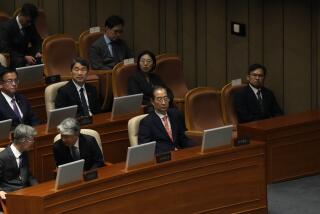Israel Leader Skips Parliament Opener
- Share via
JERUSALEM — Israel’s president, dogged by rape allegations and calls to step down, sat out the opening of parliament’s winter session Monday after some lawmakers threatened to protest his presence.
A day after police recommended that President Moshe Katsav be indicted over rape and other sexual misconduct charges involving female former employees, some members of parliament said they would boycott or stay in their seats if he took part in the ceremonies. It is customary for lawmakers to rise as the president, whose post is largely ceremonial, takes his place in the gallery seats reserved for dignitaries.
Katsav, who has steadfastly denied the charges, earlier had insisted he would attend.
Investigators on Sunday also recommended to Atty. Gen. Menachem Mazuz that Katsav be charged with tapping the telephones of staff members and using public funds to buy gifts. Mazuz is expected to make a decision on whether to issue an indictment in two or three weeks.
The various allegations carry prison terms ranging from three to 16 years.
The police recommendations gave new energy to a scandal that has kept Katsav as front-page news and the butt of Israeli satire for months after a former employee in the president’s office accused him of forcing her to have sex. In a country of news junkies, nearly everyone has come to know the first initial of the main female accuser, A, since that is how she has been identified in media reports.
Other women who formerly worked for Katsav have stepped forward with allegations of sexual harassment, though police recommended a rape charge in only one other case, that of a staffer when Katsav was Israel’s tourism minister.
Katsav, 60, a longtime member of the conservative Likud Party with a drab but relatively clean image, says the charges were part of an attempt to blackmail him. He has accused political rivals of seeking to undermine him.
Pundits say the damage has been done and that Katsav, whose job largely is to project the nation’s honor at home and abroad, has little choice but to step down. In Israel, political power rests in the hands of the prime minister.
“The man Moshe Katsav is innocent as long as it has not been proven otherwise. But the man is one thing and the president another,” columnist Nahum Barnea wrote in Monday’s editions of the daily Yediot Aharonot newspaper. “President Moshe Katsav cannot continue in his position much longer.”
The president’s lawyer said Katsav probably would resign if formally indicted.
“If an indictment is presented, then the president will not try to close any deals with the justice department,” the attorney, Zion Amir, told Israel Radio. “He will reach his conclusions and probably resign. There is no other choice.”
Katsav’s brother, Lior, on Monday angrily accused police of shoddy work and bias, saying the female accusers came forward only under pressure from police and Israeli journalists.
The case has deepened a feeling among many Israelis of disdain toward their politicians, whom they typically view as corrupt and self-interested. Police have investigated prime ministers for wrongdoing in recent years but no indictments were issued.
Katsav’s predecessor, Ezer Weizman, resigned in 2000 amid a personal financial scandal, though he was never charged. Weizman died last year.
Katsav has largely gone about his duties despite the allegations, which first surfaced in July. However, he sat out the swearing-in of the new president of Israel’s Supreme Court last month because of the controversy.
Several of Katsav’s critics in parliament have threatened to seek his ouster if he doesn’t resign.
Under Israeli law, a sitting president cannot be tried, meaning that Katsav could not be put on trial unless he were to step down, be removed from office or finish his term, which ends next year.
Katsav, who was born in Iran, was first elected to parliament in 1977, when Likud first came to power. He later held several government posts, including heading the ministries of tourism, transportation, and labor and social welfare.
He was elected president by parliament in an upset win in 2000.
*
More to Read
Sign up for Essential California
The most important California stories and recommendations in your inbox every morning.
You may occasionally receive promotional content from the Los Angeles Times.













